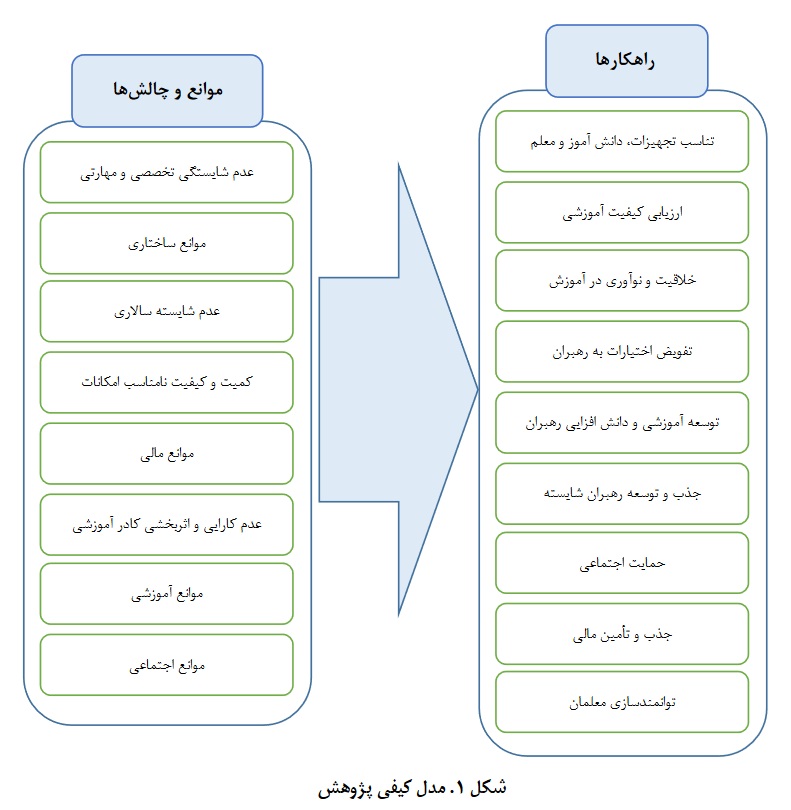شناسایی موانع و چالشهای رهبری آموزشی در مدارس ابتدایی
کلمات کلیدی:
مدیر آموزشی, رهبری آموزشی, مدارس ابتدایی, موانع رهبریچکیده
رهبران آموزشی در مدارس به دلیل سرعت پیشرفت و تغییرات اجتماعی و اقتصادی با چالشهای زیادی روبهرو هستند لذا هدف از انجام این تحقیق شناسایی موانع و چالشهای رهبری آموزشی در مدارس ابتدایی بود. تحقیق حاضر با استفاده از راهبرد اکتشافی انجام شده است. جامعه آماری در این تحقیق شامل کلیه مدیران مدارس ابتدایی، اساتید و خبرگان مدیریت آموزشی در استان آذربایجانغربی بود. روش نمونهگیری به صورت هدفمند با معیار اشباع نظری و به شیوه گلوله برفی با تعداد 19 نفر بود. برای جمعآوری دادهها از مصاحبه نیمه ساختاریافته استفاده شد. تحلیل دادهها با استفاده از کدگذاری باز، محوری و انتخابی انجام گردید. بر اساس نتایج به دست آمده در این تحقیق موانع رهبری آموزشی شامل 8 مانع اصلی یعنی عدم شایستگی تخصصی و مهارتی رهبران، موانع ساختاری، عدم شایسته سالاری، کمیت و کیفیت نامناسب امکانات و تجهیزات، موانع مالی، عدم کارایی و اثربخشی کادر آموزشی، موانع آموزشی و موانع اجتماعی میباشد و راهکارهای لازم برای رفع موانع و چالشهایی پیش روی رهبران در مدارس ابتدایی شامل تناسب تجهیزات، دانش آموز و معلم، ارزیابی کیفیت آموزشی، خلاقیت و نوآوری در آموزش، تفویض اختیارات به رهبران، توسعه آموزشی و دانش افزایی رهبران آموزشی، جذب و توسعه رهبران شایسته، حمایت اجتماعی، جذب و تأمین مالی و توانمندسازی معلمان میباشد.
دانلودها
مراجع
Tian M, Risku M. A distributed leadership perspective on the Finnish curriculum reform 2014. Journal of Curriculum
Studies. 2019;51(2):229-44. doi: 10.1080/00220272.2018.1499806. https://doi.org/10.1080/00220272.2018.1499806
Mitchell RM, Kensler LA, Tschannen-Moran M. Examining the effects of instructional leadership on school academic
press and student achievement. Journal of School Leadership. 2015;25(2):223-51. doi: 10.1177/105268461502500202.
https://doi.org/10.1177/105268461502500202
du Plessis A, Heystek J. Possibilities for distributed leadership in South African schools: Policy ambiguities and blind
spots. Educational Management Administration & Leadership. 2019. doi: 10.1177/1741143219846907.
https://doi.org/10.1177/1741143219846907
Miller PW. The nature of school leadership. The Nature of School Leadership: Palgrave Macmillan, Cham; 2018. p.
-85.
Gurr D, Drysdale L, Longmuir F, McCrohan K. The Leadership, Culture and Context Nexus: Lessons from the
Leadership of Improving Schools. International Studies in Educational Administration. 2018;46(1):22-44.
Dimmock C, Tan CY. Explaining the success of the world's leading education systems: The case of Singapore. British
Journal of Educational Studies. 2016;64(2):161-84. doi: 10.1080/00071005.2015.1116682.
https://doi.org/10.1080/00071005.2015.1116682
Meyers CV, Hambrick Hitt D. School turnaround principals: What does initial research literature suggest they are
doing to be successful? Journal of Education for Students Placed at Risk (JESPAR). 2017;22(1):38-56. doi:
1080/10824669.2016.1242070. https://doi.org/10.1080/10824669.2016.1242070
Harris A, Jones M, Huffman JB. Teachers leading educational reform: The power of professional learning
communities: Routledge; 2017.
Fullan M. All systems go: The change imperative for whole system reform: Corwin Press; 2010.
Bloom C, Owens E. Principals' Perception of Influence on Factors Affecting Student Achievement in Low- and HighAchieving Urban High Schools. Education & Urban Society. 2013;45(2):208-33. doi: 10.1177/0013124511406916.
https://doi.org/10.1177/0013124511406916
Mazurkiewicz G, Fischer JM. The Power of Responsive Educational Leadership: Building Schools for Global
Challenges: Routledge; 2021.
Zulu JK, Bhengu TT, Mkhize BN. Leadership challenges and responses to complex township school life: perspectives
from four secondary schools in South Africa. International Journal of Leadership in Education. 2021;24(2):206-25. doi:
1080/13603124.2019.1623918. https://doi.org/10.1080/13603124.2019.1623918
Day C, Sammons P. Successful leadership: A review of the international literature. Reading, England: CfBT Education
Trust; 2013.
Litz D, Hourani RB, Scott S. Leadership challenges in an educational program at a UAE juvenile detention center: A
contextual analysis. International Journal of Educational Development. 2020;76. doi: 10.1016/j.ijedudev.2020.102193.
https://doi.org/10.1016/j.ijedudev.2020.102193
Day C. Sustaining success in challenging contexts: leadership in English schools. Journal of Educational
Administration. 2005;43(6):573-83. doi: 10.1108/09578230510625674. https://doi.org/10.1108/09578230510625674
Hallinger P. Bringing context out of the shadows of leadership. Educational Management Administration &
Leadership. 2018;46(1):5-24. https://doi.org/10.1177/1741143214535744
Jeynes WH. Effects of Family Educational Cultures on Student Success at School: Directions for Leadership. How
School Leaders Contribute to Student Success: Springer, Cham; 2017. p. 311-28.
Zare S, Hosein Qolizadeh R, Mehram B. Identification and description of the dominant leadership model and its
characteristics in high schools in Birjand. Management and Planning in Educational Systems. 2019;12(1):339-68. doi:
29252/mpes.12.1.339. https://doi.org/10.29252/mpes.12.1.339
Mard SM, Zeynabadi HR, Abdollahi B, Arasteh HR. Indicators of a successful educational leader: Findings from a
phenomenological study. School Management. 2017;5(2):109-28.
Creswell JW, Miller DL. Determining validity in qualitative inquiry. Theory into Practice. 2000;39(3):124-30. doi:
1207/s15430421tip3903_2. https://doi.org/10.1207/s15430421tip3903_2
Ebrahimizadeh B, Nazem F. Identification and formulation of the components affecting the competency model of
primary school managers in Tehran. Quarterly Journal of Educational Leadership and Management. 2018;12(4):9-23.
Moswela B, Kgosidialwa K. Leadership and school success: Barriers to leadership in Botswana primary and secondary
schools. Educational Management Administration & Leadership. 2019;47(3):443-56. doi: 10.1177/1741143217739355.
https://doi.org/10.1177/1741143217739355
Garza JE, Drysdale L, Gurr D, Jacobson S, Merchant B. Leadership for school success: Lessons from effective
principals. International Journal of Educational Management. 2014;28(7):798-811. doi: 10.1108/IJEM-08-2013-0125.
https://doi.org/10.1108/IJEM-08-2013-0125
González-Falcón I, García-Rodríguez MP, Gómez-Hurtado I, Carrasco-Macías MJ. The importance of principal
leadership and context for school success: insights from '(in) visible school'. School Leadership & Management. 2019:1-18.
doi: 10.1080/13632434.2019.1612355. https://doi.org/10.1080/13632434.2019.1612355
Hemmatyar Z, Abdollahi B, Nooh Ebrahim A, Zeynabadi HR. Identification of dimensions and behavioral
components of visionary educational leaders in primary schools: A phenomenological study. School Management.
;7(3):172-91.
Freeman GT, Fields D. School leadership in an urban context: complicating notions of effective principal leadership,
organizational setting, and teacher commitment to students. International Journal of Leadership in Education. 2020:22-42. doi:
1080/13603124.2020.1818133. https://doi.org/10.1080/13603124.2020.1818133
Brauckmann S, Pashiardis P, Ärlestig H. Bringing context and educational leadership together: Fostering the
professional development of school principals. Professional Development in Education. 2020:1-12. doi:
1080/19415257.2020.1747105. https://doi.org/10.1080/19415257.2020.1747105

دانلود
چاپ شده
ارسال
بازنگری
پذیرش
شماره
نوع مقاله
مجوز
حق نشر 2024 نشریه پژوهش و نوآوری در تربیت و توسعه

این پروژه تحت مجوز بین المللی Creative Commons Attribution-NonCommercial 4.0 می باشد.










